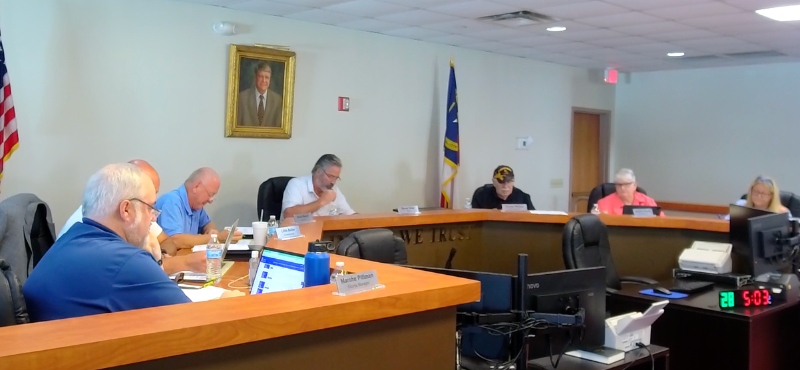Sylva mayor: “Sometimes bigger is better”
Published 3:29 pm Thursday, February 24, 2011
Sylva officials talk about joint water/sewer system
Officials from Sylva, N.C., which is now part of the Tuckaseigee water and sewer authority in Jackson County, said despite the challenges of creating a joint water and sewer authority, they would do it again, and they urged Polk County to do the same.
Polk County, Columbus, Saluda and Tryon officials continued discussions on the possibility of creating a joint water system on Tuesday, Feb. 22. This was the first time the joint group has met since September 2010 because of elections, holidays and weather.
The group invited current Sylva Mayor Maurice Moody and former Sylva Mayor Brenda Oliver to discuss the process of creating Tuckaseigee’s joint system between Jackson County and the towns of Sylva, Dillsboro and Webster.
“As close as Webster, Sylva and Dillsboro are together, it really didn’t make sense to have all the systems,” said Moody. “Sometimes bigger is better in consolidating costs.”
The Tuckaseigee system was created in 1992 at a time when the Town of Sylva was looking at $1 million of upgrades to its water plant.
“We were getting requests from outside Sylva for water,” Oliver said. “We had a couple of drought periods and were having to dig some wells. So we were between a rock and a hard place. We began meeting with other areas. I commend you for doing this because it’s probably the only way we could have survived and had any growth in our area. We could not have supplied enough water for any industry.”
Some of Sylva’s issues and demographics seemed similar to those of Polk County, Columbus, Saluda and Tryon.
Jackson County currently has approximately 35,000 residents, the Town of Sylva has approximately 2,500, Dillsboro has about 200 residents and Webster has about 500.
Polk County has approximately 19,000 residents, with Tryon’s population at around 1,900, Columbus at 1,000 and Saluda with 560 residents.
Moody said when the Tuckaseigee system was formed the authority took over all infrastructure from each town “lock stock and barrel.”
One of the problems over the years has been aged water and sewer lines that were unknown and not mapped that didn’t meet state requirements for size. Moody said agreeing on who is responsible for repairing those lines has been an issue, but in his opinion if it’s a line that runs down the middle of a public street, the authority owns it, not the town.
Oliver said another issue Polk County and its towns need to be aware of is what happens when areas are annexed. When an area is annexed into a Jackson County town, the town must extend services to the area, but then immediately turn over the infrastructure to the water and sewer authority.
Columbus councilwoman Ernie Kan asked Sylva officials if the residents were pleased with the joint system.
Moody answered that residents opinions are mixed.
“The quality of the water is fine,” said Moody. “I think they do a good job at the water plant. One of the biggest complaints is the impact fees. They are high enough to discourage some commercial customers. For residents, you can put in a septic system for what you can [pay to] tie on [to the joint system].”
Oliver said the rates went up when the authority took over, but she thinks everyone understood that was going to happen.
“Our bills are not outrageous, but they are a lot more than they were,” said Oliver.
In comparison, Oliver explained that her Sylva water bill used to be $12 to $14 and went up about $25 including sewer fees. The Tuckaseigee authority fees are between $40 and $50 per month for a three-person home, including water, sewer and the usage fee, she said.
Columbus officials questioned Sylva mayors on how they dealt with no longer having the revenue from water and sewer systems.
Oliver said it was tough for a few years with a void, but with fund balance and savings from no longer paying a few employees it worked out. The towns’ water and sewer employees transferred to work for the authority in Jackson County.
“The first few years were rough,” Oliver said. “We depended on our fund balance to get us over rough places and adjusted the budget. We just took out what we had to.”
Columbus has indicated through some of the joint meetings that it is not interested in joining an authority because the town is dependent on water revenues. Columbus is in a slightly different situation that the other towns, because it receives its water from wells.
Columbus is, however, looking at needed upgrades to its aged wastewater treatment plant. Costs to upgrade the plant, upgrade a hospital pump station and bring a fifth well online are estimated at approximately $3.6 million.
Tryon is nearing completion of $3 million of upgrades to its water plant. Tryon Mayor Alan Peoples said at the meeting that Tryon’s water plant could serve the whole county while a new water plant for the authority is being built.
Sylva’s water plant served the joint authority while a new Tuckaseigee water plant was being constructed.
One difference between Jackson County’s joint effort and Polk County’s potential joint effort is debt. The towns in Jackson County came to the joint venture with infrastructure and equipment, but no debt.
Polk County currently has no water debt, but the towns do. Tryon and Columbus have almost $8.5 million combined in water and sewer debt currently.
Polk, Columbus, Saluda and Tryon began meeting on joint issues in June 2010. This effort is not the first time the groups have met to create a water authority. During drought conditions earlier this decade, the group held similar joint discussions, but they broke off as a result of disagreements between the county and towns. Columbus, Tryon and Saluda decided to create a back-up system for one another and the county went on its own to create its own system.
On Monday, elected officials from the county, Columbus, Tryon and Saluda directed their managers to begin working together to come up with parameters for creating a water and/or sewer authority, such as where the assets would come from, the feasibility and how much debt the authority would take on.
Elected officials also discussed joint ventures on economic development on Monday. They scheduled the next joint meeting tentatively for April 26. The group plans to invite the county economic development commission to attend for discussions.
The county and towns have been holding the joint meetings at Columbus Town Hall.





